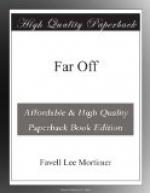There is one city in Chinese Tartary where many strangers come to trade with the people. It is called Yarkund. There caravans arrive from Pekin, laden with tea, after a journey of five months over the wilds of Tartary. Then merchants come from Bokhara to buy the tea, and to carry it home, where it is so much liked.
AFFGHANISTAN.
This land is not a desert. Yet there are but few trees, and because there is so little shade, the rivulets are soon dried up. Yet it might be a fruitful land, if the inhabitants would plant and sow. But they prefer wandering about in tents, and living upon plunder, to settling in one place and living by their labor. The Tartar has good reason for roaming over his plains, because the land is bad; but the Affghan has no reason, but the love of roaming.
The plains of Affghanistan are sultry, but the mountains are cool; for their tops are covered with snow. The shepherds feed their flocks on the plains during the winter; but in the spring they lead them to the mountains to pass the summer there. Then the air is filled with the sweet scent of clover and violets. The sheep often stop to browse upon the fresh pasture; but they are not suffered to linger long. The children have the charge of the lambs; an old goat or sheep goes before to encourage the lambs to proceed, and the children follow with switches of green grass. Many a little child who can only just run alone, enjoys the sport of driving the young lambs. The tents are borne on the backs of camels. The men are terrible-looking creatures, tall, large, dark, and grim, with shaggy hair and long black beards. They wear great turbans of blue check and handsome jackets, and cloaks of sheep-skin; they carry in their girdles knives as large as a butcher’s; and on their shoulders a shield and a gun.
Besides these wild wanderers, there are some Affghans who live in houses.
Cabool, the capital, is a fine city, and the king dwells in a fine citadel. The bazaar is the finest in all Asia. It is like a street with many arches across it; and these people sell all kinds of goods.
But what is a fine bazaar compared to a beautiful garden? Cabool is surrounded by gardens: the most beautiful is the king’s. In the midst is an octagon summer-house, where eight walks meet, and all the walks are shaded by fruit-trees. Here grow, as in Bokhara, the best fruits to be found in an English garden, only much larger and sweeter. The same kind of birds, too, which sing in England sing among its branches, even the melodious nightingale. It is the chief delight of the people of Cabool to wander in the gardens: they come there every evening, after having spent the day in sauntering about the bazaar; for they are an idle people, talking much and working little.
The noise in the city is so great that it is difficult to make a friend hear what you say: it is not the noise of rumbling wheels as in London, for there are no wheeled carriages, but the noise of chattering tongues.




